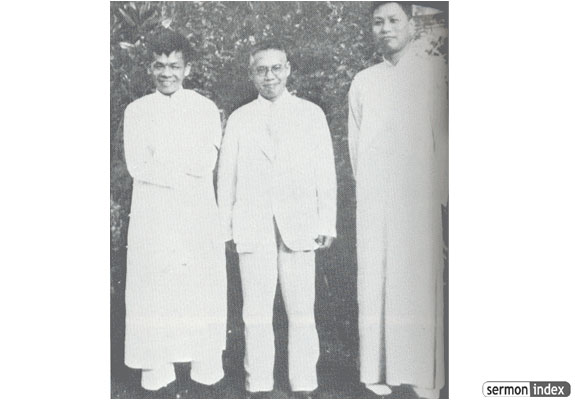Leland Wang
 John Sung, Leland Wang and Watchman Nee in Shanghai, 1934 1
John Sung, Leland Wang and Watchman Nee in Shanghai, 1934 1
Leland Wang, or Wang Zai (王载) (1898–1975) was apparently the first of the young Fuzhou brothers to meet M. E. Barber 2
Gospel Revival in Fuzhou
That year, he left his career as a Navy gunboat officer and gave himself to a life of preaching the gospel. He lead many gospel endeavors with Watchman Nee and the rest of young Fuzhou brothers . Many high school students were coming to Christ. Nee recounts a time when sixty people were seeking baptism as a result of their preaching.
Many of this gospel band were barely more than teenagers. John Wang and Leland Wang, being several years older than the rest, were the natural leaders. Leland in fact is also the brother with whom Nee famously butted heads for years (Nee was born in 1903.)
“At that time our group comprised of seven workers. We had a meeting every Friday but much of the time was spent in argument between myself and the other leader of the group. Being youthful, we were proud of our own ideas and quick to criticize the opinions of the other. At times I lost my temper and found it very hard to admit that I was wrong. Every Saturday I visited Sister Barber and complained about his attitude, asking her to intervene and correct his errors. She rebuked me because he was five years older than I, saying, “The Scripture says that the younger should obey the elder.” 3 See also –> Teaching Others to Bear the Cross
Gathering as a church
In 1922, Wang, his wife, and Nee broke bread together to celebrate the Lord’s Table simply in the Lord’s name. This was novel at the time, as neither of the brothers were ordained or authorized by any denomination. However, they became convicted that the Bible gave them freedom to gather in this way. They began to do this regularly and invited the other saints to join them.4 This was the beginning of the church in Fuzhou.
This continued for several years until some friction, whether personal or relating to different visions of their work, caused Leland Wang and John Wang to excommunicate Watchman Nee from their gathering. Though this rift in 1924 was never mended, they remained in similar circles for several years.
Miss Barber, likely aware of these issues, remained a watchful mentor throughout this period. In Barber’s 1926 letter to D. M. Panton, she writes very concernedly about the younger Faithful Luke and Watchman Nee’s spiritual challenges, and mentions Wang positively with little comment:
“Three sisters & one brother were baptised here this week by Leland Wang. We have precious bands of village men an women coming for teaching.” See –> Letters - 1926.4.2 to D. M. Panton
Developing Career
However, later as Wang began to receive notoriety for his preaching, Miss Barber became concerned:
He (Watchman Nee) told me (Witness Lee) that when his co-worker, who was five years older than he, was traveling through the country conducting evangelistic meetings, Margaret Barber, realizing the peril of popularity, warned him by saying, “If you continue to travel for evangelistic work, I will not pray for you any longer.” She had the foresight to realize that such work would bring shipwreck to his spiritual life. Eventually, that is exactly what happened. That other co-worker was distracted from spiritual life to popular work. 5
Wang likely received ordination as a pastor in the Christian & Missionary Alliance though when is unclear.6 In 1928 to form the Chinese Foreign Missionary Union (中华国外布道团) with his younger brother Wilson Wang, or Wang Zhi (王峙), and the C&MA missionary Robert A. Jaffray 7
He was often called the “Moody of China” and lived by the rule “No Bible, No Breakfast.” 8
Footnotes
1 - John Sung, Leland Wang and Watchman Nee, Shanghai 1934 - Sermon Index (https://www.sermonindex.net/modules/myalbum/photo.php?lid=381)
2 - “One day early in 1921, a Republic warship dropped anchor off White Teeth Rock and a young naval officer came ashore. As he walked past the customs station, he was halted by the sound of hymn-singing coming from a mission building, so he went in and introduced himself. His name was Wang Zai (Leland Wang), a native of Fuzhou and the elder brother of Watchman’s classmate Wilson Wang. *” Kinnear, Angus. Against the Tide: The Unforgettable Story of Watchman Nee (p. 48). CLC Publications. Kindle Edition. (This anecdote is dated *early 1921. Watchman Nee and his mother were baptized by M. E. Barber and Li Ai-Ming on March 28 (perhaps only Li, a co-worker of Barber’s was in the water.). That was his mother’s first meeting Barber but Watchman had been going to White Teeth Rock for Bible study from before this. If Leland was not the first of this group to meet Miss Barber, it at least appears from the above anecdote that it was independent of Watchman. Either they found her separately or Wang introduced Nee to her.)
3 - Weigh, K. H., ed. Watchman Nee’s Testimony. Anaheim: Living Stream Ministry, 1981.
4 - Kinnear, Angus. Against the Tide: The Unforgettable Story of Watchman Nee (p. 53). CLC Publications. Kindle Edition.
5 - Lee, Witness Watchman Nee: A Seer of the Divine Revelation in the Present Age. Anaheim: Living Stream Ministry, 1991, pg. 86 I have placed this quote after the 1926 letter, but the date of this comment is uncertain.
6 - Angus Kinnear states that he did become ordained in the 1923/4 (pg. 93) but another sorce states he never was and obtained degrees later in the US. https://cchcau.org/?page_id=13473
7 - Indigenous Mission Movements in China by Steve Z in Mission Round Table Vol. 11 no. 3 (Sep-Dec 2016): 21-32 (https://omf.org/en/post/-/news-and-stories/2020/1/10/indigenous-mission-movements-in-china)
8 - Wong, Hoover(http://bdcconline.net/en/stories/wang-zai)